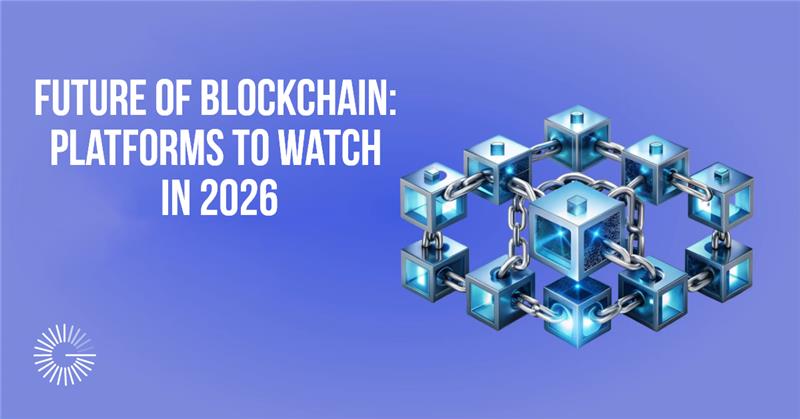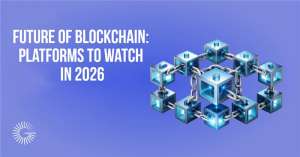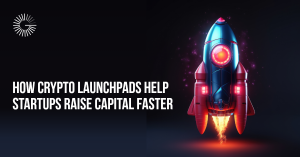The use of blockchain technology has no longer been limited to the initial application in cryptocurrency but is becoming a core technology in the industry, whether financial or in fields like supply chain management or healthcare. With the onset of 2026, it can be predicted that the need for blockchain development will just increase as more businesses seek to incorporate blockchain in their operations to enhance security, transparency and efficiency.

As a developer, startup or enterprise, it is important to select the appropriate blockchain platform. The landscape is saturated with new platforms, each having its features and capabilities. This blog is a discussion of the best blockchain platforms to follow in 2026 that delves into the uniqueness of each platform and how companies can use them to their advantage.
Ethereum: The Smart Contract Pioneer
Ether has been the market leader in the blockchain industry and its imminent shift to Ethereum 2.0 is only going to cement its status. Replacing the Proof of Work (PoW) with Proof of Stake (PoS) will make Ethereum highly scalable, lower the energy usage, and accelerate the speed of transactions. These developments will play a critical role in giving rise to the popularity of decentralized finance (DeFi) and decentralized applications (dApps).

Since the launch of Ethereum it has been used to establish the paradigm of smart contracts, automated contracts coded by computer and executed upon meeting a specific set of conditions. Ethereum is still the platform of choice when it comes to developers willing to build secure and efficient blockchain development company smart contracts which makes it a must-watch in 2026. As the Layer 2 scaling solutions, such as Arbitrum and Optimism, continue to rise, Ethereum will be ready to make transactions even faster and more efficient.
Read Our Blog:- Why Startups Should Prioritize Android App Development Before iOS
Solana: The Speed and Scalability Champion
Solana entered the blockchain market with a vision of addressing the scalability problem that is bedeviling most blockchain networks. Solana can handle thousands of transactions per second (TPS) by a special Proof of History (PoH) consensus mechanism, which is much higher than what Ethereum and other networks can handle.
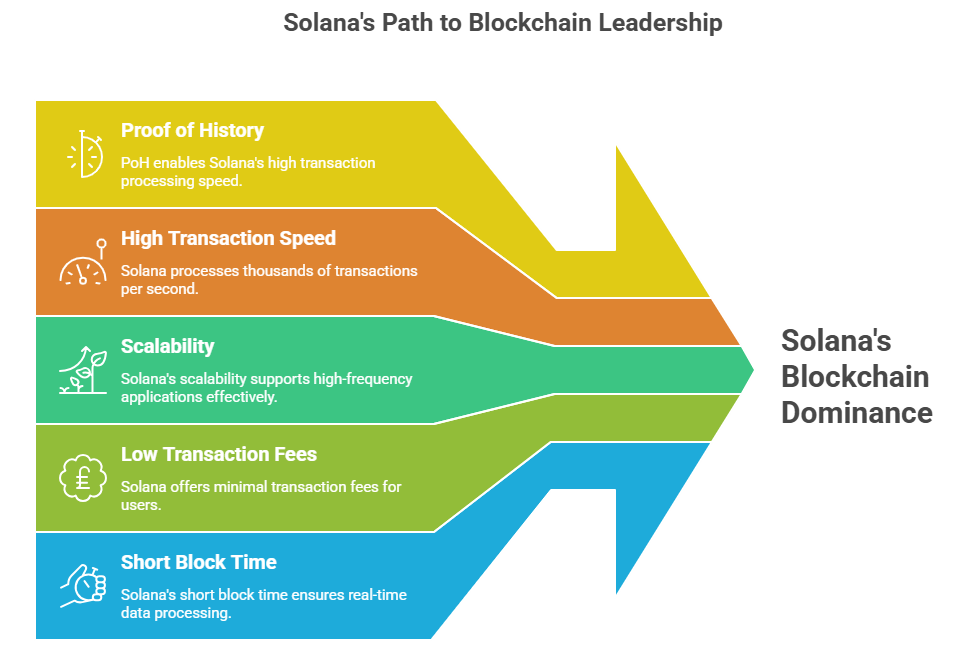
Solana is fast and scalable and can be used by developers who create high-frequency applications, including gaming, NFTs, and decentralized finance (DeFi). Having a smaller transaction fee and a shorter block time, Solana can potentially be an intriguing platform to follow as blockchain gains popularity because of its ability to process large amounts of data in real-time.
Read Our Blog:- How Crypto Launchpads Help Startups Raise Capital Faster
Polkadot: Interoperability at Its Core
Polkadot was created interoperatively. It provides the ability of the various blockchains to be able to communicate with each other and allows them to transfer data and value between different chains. To the businesses and developers seeking enterprise blockchain consulting, Polkadot offers a secure and scalable architecture of cross chain interactions.
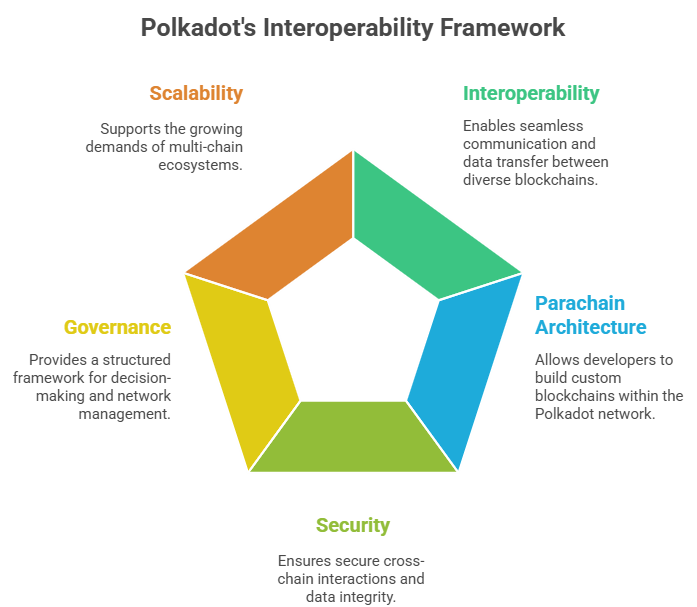
The difference between Polkadot and other blockchain networks is its parachain architecture that enables developers to build their own blockchains on the Polkadot network. Such parachains can in turn interact in a seamless manner with security, governance, and scalability being shared. Due to the growing popularity of multi-chain ecosystems, a novel approach to interoperability presented by Polkadot will place it among the most significant platforms in 2026.
Read Our Blog:- The Evolution of NFT Marketplaces: What Businesses Should Know
Avalanche: The Speed and Flexibility Leader
Avalanche is meant to solve the scalability and decentralization problems which have constrained the functionality of conventional blockchains. Having a finality time that is less than a second (the amount of time it takes to finalize a transaction) and capable of processing thousands of transactions per second, Avalanche is competing to be a leader in high-speed, decentralized applications.

There is also the Avalanche-X ecosystem that is offered by Avalanche to support the development of custom blockchains that can be used in different applications and interact with the other chains effectively. This has enabled Avalanche to be a champion among developers and companies due to its support and its fast transaction speed which is lightning-fast. Due to the increased utilization of blockchain in different industries, Avalanche is a promising platform to watch in 2026 and beyond with its versatility and output.
Hyperledger Fabric: Enterprise Blockchain Solutions
In case any business wants to use blockchain either privately or in a permissioned setting, Hyperledger Fabric is the solution to use. As an enterprise-oriented model, Hyperledger Fabric is capable of supporting smart contracts, private transactions, and multi-organization governance, which is why it is suitable in such spheres as supply chain, finance, and healthcare.
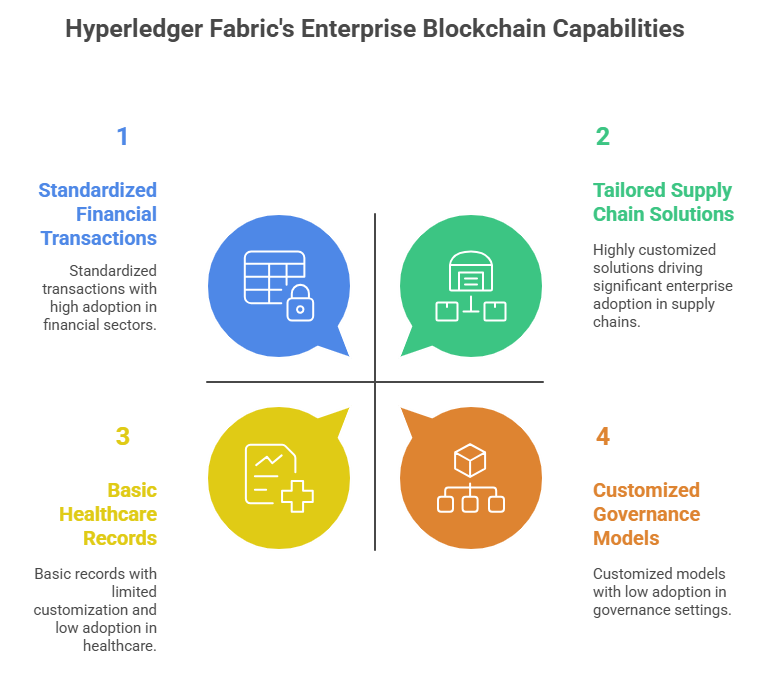
It has a modular architecture which means that businesses can tailor their blockchain networks to their specific requirements. Having significant backing by large corporations and organizations, such as IBM and SAP, Hyperledger Fabric is steadily growing in the use of blockchain solutions in enterprises. With enterprise blockchain development growing, the capability of Fabric to provide secure, scalable, and interoperable solutions makes it one of the major participants in 2026.
Cardano: Building for Sustainability
It is now known that cardano has been dedicated to principles of sustainability and social impact, and its growth has been based on peer reviewed research and evidence-based design. Cardano aims to be more sustainable and long-term oriented (with Proof of Stake or PoS) unlike other blockchains, which minimizes its impact on the environment in comparison with Proof of Work systems.

Cardano is also seeking to offer blockchain solutions in emerging economies, specifically in Africa, with scalability, security, and sustainability as their concept. It is one of the most promising platforms to monitor in 2026, due to its smart contract functionality and an expanding collection of decentralized applications.
Cosmos: The Internet of Blockchains
The concept behind Cosmos is the development of an Internet of Blockchains, in which blockchain networks should be able to work together. It has a special Tendermint consensus algorithm, which provides scalability, block finality in not much time and its Cosmos SDK facilitates the development of custom blockchains with ease.

The emphasis Cosmos has on interoperability makes it one of the major participants in the future of blockchain ecosystems. Allowing interaction and data sharing across different blockchain networks, Cosmos gives businesses the chance to add the blockchain technology and not be confined to one network. With the further development of the blockchain, the mission of Cosmos in interconnectedness between fragmented networks will be of critical importance.
Conclusion
The blockchain ecosystem is fast transforming and the platforms which are dominant today might appear quite different in 2026. The one-size-fits-all answer is that whether the emphasis is on scalability, interoperability, or sustainability, there exists no specific answer. But such platforms as Ethereum, Solana, Polkadot, Avalanche, and Hyperledger Fabric are distinguished by their specific capabilities and market perspective.
The selection of the appropriate blockchain platform is based on the needs, goals, and the resources of your business. To make sure that they choose the most appropriate platform to succeed their project, startups, enterprises, and developers have to be aware of the current developments in blockchain technology.
At Gyan Consulting, we work through the body of knowledge of blockchain development and help businesses to overcome the challenges of the field. Our specialists are prepared to help you make the right choice of the platform and how you can use blockchain in your business strategy.

With a deep passion for technology and enterprise growth, I help organizations embrace AI development, blockchain solutions, and custom software to drive lasting transformation. As Senior Business Development Manager at Gyan Consulting, I combine strategic insight with hands-on industry knowledge, enabling businesses to scale smarter and innovate with confidence. View Profile



